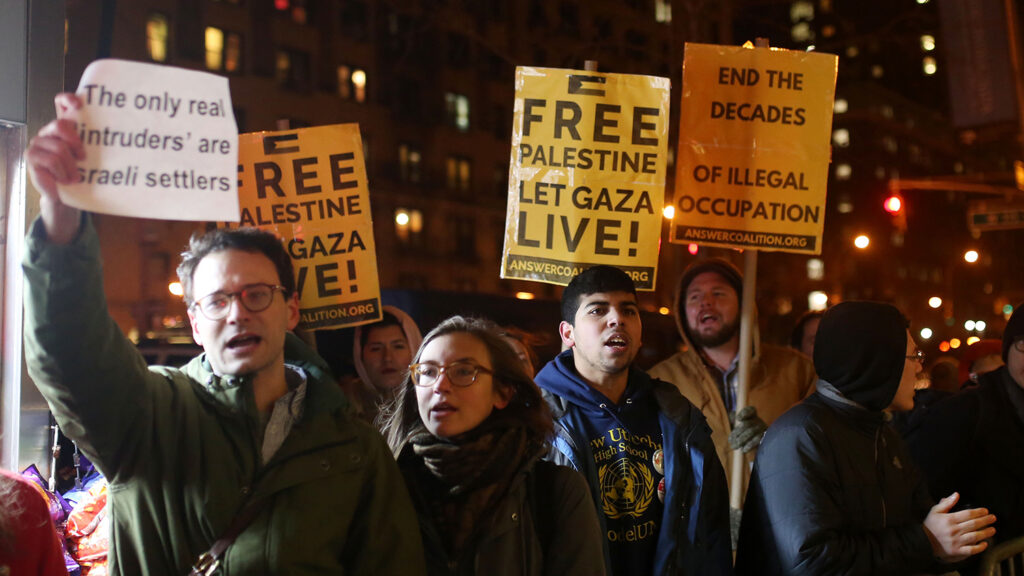Reframing the Debate Around Israel’s Obligations to Gazan Civilians
BY JACOB SHAYEFAR
“Remember what Amalek did to you along the way when you came out of Egypt. When you were weary and worn out, they met you on your journey and attacked all who were lagging behind; they had no fear of God. When the Lord your God gives you rest from all the enemies around you in the land he is giving you to possess as an inheritance, you shall blot out the name of Amalek from under heaven. Do not forget!” (Devarim 25:17-19).
Enemies of Israel often wail that Israel is not doing enough to help Palestinian civilians. They mention movement restrictions, the shutting off of power in Gaza, the strikes on hospitals, and the Palestinian civilian death tolls. They accuse Israel of committing an apartheid, of valuing Jewish, Israeli lives over those of the darker Palestinians. They bemoan indiscriminate air strikes, raids on mosques, and settlements in the West Bank. To prove their point, they cite differences in casualty counts, UN and other international reports, and the generally atrocious conditions in Gaza. In short, they accuse the Jews of genocide.
Zionists refute these claims. They mention the necessity of movement restrictions; the trucks of humanitarian aid going into Gaza, even in times of war; the pipelines from Israel that supply water; the supply of electricity (in times of peace); and the subsequent improvement of life in Gaza that this assistance brings. Israel’s defenders mention that when Israel wants to help civilians, Hamas prevents them from doing so. For example, Hamas spent sixteen years using water pipes to make missiles. They note the ample warning the IDF gives before airstrikes (the U.S. National Security Council Spokesman John Kirby recently noted he’s not sure the United States would ever provide such thorough warnings) and that the mosques and hospitals the IDF targets always turn out to be terrorist hideouts. These defenders point out that Nazi Germany had more civilian casualties than the UK, that Dresden was reduced to rubble; they remind that the UN is worthless. And they’re right. But it is also where they go wrong.
When Zionists engage in this debate, they concede that Israel has a moral obligation to help the civilians of its enemy. And once they make this concession, Israel cannot win.
If Israel accepts responsibility for the Palestinian civilians, then Israel will find itself making hard decisions between safeguarding the Palestinians and helping its own people. If Israel must care for Palestinian lives the same way it cares for Israelis, Israel’s legitimacy to continue the war comes into question. Anytime Israel retaliates against a Hamas attack, a Palestinian civilian might suffer. If the IDF destroys an apartment building being used to manufacture rockets, that’s one less building for a civilian to live in. If they kill a terrorist, that’s one fewer brother, son, or father.
Thus, Israel must pick one: either the well-being of Gazan citizens or its self-preservation.
Making Israel take responsibility for both citizenries—and care for Palestinian lives more than Hamas does—puts Jerusalem in an impossible position. It has never been the case that a nation was viewed as responsible for the well-being of its enemy. In the Classical Age, the Romans didn’t care about the plight of the Goths. In more contemporary times, Roosevelt and Churchill were not expected to take responsibility for the Japanese or German citizens. It has never been the case that unending aid was expected from warring nations. France never gave money to Germany as the Nazis marched on Paris. Only Israel is expected to do such things.
All of Israel’s defenders must refute this framing. We Jews, who annihilated the Moabites, drove out the Canaanites, and continue to blot out the Amalekites whenever they arise, cannot be expected to take responsibility for our enemy. We must put our self-preservation first. We must stand firm that we have no responsibility to support or enable evil.
When, according to the Arab World Research and Development (AWRAD) group, over 60 percent of Gazan civilians support the actions taken on October 7, when released terrorists are given hero’s welcomes, when they chant cries to stab Jews and pay young men to do just that, there’s nothing else to call it.
The IDF is a moral army. It does not, and should not, seek collective punishment. But we should not let Israel’s detractors forget what we are up against. The point here isn’t to hurt the Palestinian people, even those who politically support Hamas. Ishmael is, after all, not Amalek. Rather, the goal is merely the preservation of the Jewish state.
Whenever Israel lends aid to the Palestinians, it is out of an abundance of mercy. Israel has no moral obligation to aid its enemy. Thus, the fact that Israel does provide aid, that Israel seeks to ease the hurt Hamas afflicts on Palestinian civilians, is proof of Israel’s excessive goodness. And while this is acceptable, to the extent that it does not actively endanger Israelis, it cannot be used to establish the untenable standard wherein this extraordinary righteousness is viewed as expected instead of gracious.
This needs to be made clear. Zionists cannot continue to engage in an argument where the terms are biased against us. Anti-Zionists must know that it is a great privilege for the Palestinians to receive anything at all from Israel.
Zionists cannot deny reality. Israel’s defenders cannot crumble under the pressure of the institutions that push false morality. They must fight for the truth, whether the untruth comes from the media, on a college campus, or from a peer, even when it will make them unpopular.
We mustn’t lie, neither explicitly nor implicitly. And when we engage in the argument over Israeli aid, conceding that Israel must give aid in the first place, we tell a lie: we pretend that our values are not what they are; we deny our scripture.
Jews cannot compromise our values. The Torah doesn’t; the truth doesn’t. So we mustn’t either. The survival of the Jewish state depends on it.
Suggested Reading

A New Viewpoint on Diversity
Often, it seems that the people who talk about diversity never visit diverse communities. People seem to think that diversity is based on how one looks. True diversity is not about how someone looks, but how they act.

My Real Internal Conflict is Not One of Clashing Interests
When do my Jewish interests and American interests conflict? After much careful internal deliberation, I have concluded that they do not.

Regaining our Power Through Knowledge: The Solution to Rising Anti-Semitism on Campus
An emotional connection to our Judaism cannot be our only solace. Knowledge is the solution to the problem Jewish students face today.

My Tutors’ Joy and the Joys of Tutoring: The Power of Non-Traditional Learning Methods
BY YARDENA FRANKLIN Since before I can remember, I have been going to shul with my dad, my very first tutor. Listening to the davening and leyning long before I…